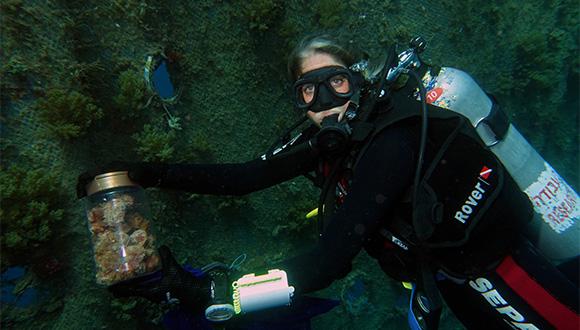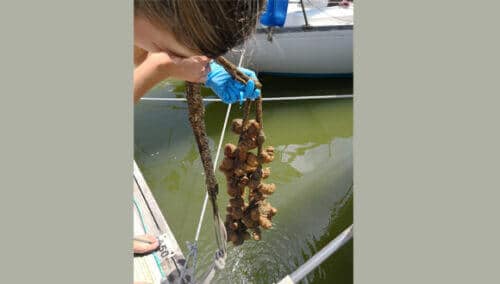Residues of drugs that are spilled into the sea cause environmental damage and severe damage to marine creatures

In the world we live in, almost every disease and injury has a cure. We take pills, apply ointments, swallow syrup, feel better and forget about the whole story. But have you ever thought about what happens to our medical waste and where it ends up? In a study led by Prof. Noa Shankar and research student Gal Navon from the School of Zoology at the George S. Wise Faculty of Life Sciences and the Steinhardt Museum of Nature Seawater was sampled at 11 different sites along the coast of Israel. In ten of them, a significant concentration of drug residues was found, which are discharged through the waste water into the sea. The drug residues were sampled in acetylenes - stationary marine invertebrates that feed on filtering seawater. It turns out that the exposure to the drugs could have a long-term effect on them and in fact disrupt the delicate balance of the entire marine life tissue, and even harm the lovers of culinary cuisine based on seafood.
What about Iztelans and human medicines?
Atlans are marine invertebrates that are several centimeters in size, clinging to hard surfaces such as rocks, piers or breakwaters. Because they feed on small particles found in the water - over time many particles from the marine environment, including pollutants, accumulate in their bodies.

As part of the study, the researchers sampled sediments from nine sites along the Mediterranean coast (Achziv, Acre, the marina in Haifa, Sdot Yam, the power plant in Hadera, the Acadia beach in Herzliya, the rock beach in Bat Yam, the marina in Ashdod and the marina in Ashkelon), and two sites in the Red Sea (the marina in Eilat and Rif the dolphins). They performed a chemical analysis on them in order to look for active substances from three drugs commonly used by humans, known for the fact that they hardly break down in sewage treatment plants and remain for a long time in the marine environment: Bezefibrate, which is used to lower blood lipid levels; Carbamazepine to treat epilepsy and stabilize mood; And diclofenac, an anti-inflammatory found in the well-known drug 'Voltran'.
The findings that were discovered are very worrying: in 10 of the 11 sites sampled, residues of the tested drugs were found in significant concentrations.
- In four sites (in Ashdod, Ashkelon, Sdot Yam and Haifa) all three materials were found
- At five sites (Achziv, Acre, Herzliya, Bat Yam and the marina in Eilat) residues of two of the three drugs were found
- In the dolphin reef in Eilat, only the remains of one drug - diclofenac - were found, but in an alarming concentration
- Particularly high concentrations of diclofenac and bazefibrate were found in Acre, Ashdod and Ashkelon
Only in the Iztelans sampled from the depths at the Hadera power plant were no drugs found at all.
do not fall apart
Prof. Shanker and researcher Gal Navon explain that the drugs that humans consume do not fully break down in our bodies, and high percentages of the active substances are excreted from the body in their original form. Additionally, due to lack of awareness, unused medications are often thrown into the toilet or trash. The wastewater treatment plants that exist today are not prepared to treat drug residues, and there is no supervision of their concentration at the end of the wastewater treatment, unlike other pollutants. In the end, a significant part of these materials ends up in the sea through the sewage system.
According to them, in the marine environment around the world there is a large variety of drug residues, including types of antibiotics, anti-inflammatories, pain relievers, hormones, antidepressants and more. "A significant number of these compounds are very stable," the researchers point out and add: "They do not break down quickly in the marine environment, and the damage to marine creatures may be particularly great, since the drugs are originally intended to act on biological systems (the human body). For example, various studies conducted around the world found that estrogen found in birth control pills creates female characteristics in male fish, and therefore damages the reproductive capacity of certain species; Prozac causes aggressiveness and risk-taking in crustaceans; Antidepressants harm the memory and learning ability of squids and more."
She also participated in the study The hydrochemical laboratory של The Center for Water Research At the Porter School of Environment and Earth Sciences at the Faculty of Exact Sciences by Raymond and Burley Sackler, led by Prof. Dror Avisher. The article was published in August 2020 in the journal Marine Pollution Bulletin.
Stop the chronic infection
"We have been working for 15 years on the chemical-physical fate of drug residues in terrestrial water sources, and the presence of these residues in the marine environment surprised us. The results of the study indicate the large extent of chronic contamination with drug residues, as well as the absorption of micro and nano-pollutants, measured in very low concentrations, by marine organisms,' says Prof. Avisher.
"In our research, we found that Israel is not exempt from the serious global problem of seawater contamination with medicinal substances. The medicines we consume reach the sea, mainly through the sewage, and cause a lot of damage to the marine environment and an indirect effect on humans, who feed on seafood and are exposed to this pollution", concludes Prof. Shankar. "In order to deal with the problem, different steps can be taken. At the individual level, we recommend that the entire population take personal responsibility and dispose of unused medications in the designated containers at pharmacies and health insurance companies. Also, we are working to expand the research on the monitoring of drug pollution along Israel's coasts, by advanced analysis for a larger variety of drugs that are widely used. In addition, we are examining what changes are caused to animals exposed to environmental concentrations of these drugs."
More of the topic in Hayadan:
- A sensor for real-time measurement of nitrate (nitrate) levels in the soil to prevent contamination of water reservoirs and to improve agricultural yields
- Plastic infections have been found in marine animals all along Israel's coasts in the Mediterranean Sea and the Red Sea
- A marine monitoring system will help identify and stop the spread of oil pollution in the sea and prevent ecological disasters

3 תגובות
It is certainly possible to return medicines to the pharmacy and also used syringes to the nurse at the health fund.
There is not enough awareness of the matter.
Like big drinking bottles I keep in circulation even though I don't get paid for them.
Why does the sewage actually reach the sea in the first place?
The motivation of the polluter and of the entire population is financial. On the day when it will be possible to redeem expired drugs and the like at a pharmacy, a whole industry of collecting unused drugs will develop. Just like what happened with the bottles and electronic waste. All that remains is to quantify the financial damage from sea pollution and from that to estimate the reimbursement cost that the state is willing to pay for medicines that were not consumed.